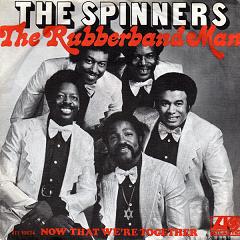| "The Rubberband Man" | ||||
|---|---|---|---|---|
 | ||||
| Single by the Spinners | ||||
| from the album Happiness Is Being with the Spinners | ||||
| B-side | "Now That We're Together" | |||
| Released | August 1976 | |||
| Studio | Sigma Sound, Philadelphia, Pennsylvania | |||
| Genre | ||||
| Length |
| |||
| Label | Atlantic | |||
| Songwriters | Thom Bell, Linda Creed | |||
| Producer | Thom Bell | |||
| The Spinners singles chronology | ||||
| ||||
| Official audio | ||||
| "The Rubberband Man" on YouTube | ||||
"The Rubberband Man" is a song recorded by American vocal group the Spinners. The song, written by producer Thom Bell and singer-songwriter Linda Creed, originated because of Bell's son Mark, who was being teased by his classmates for being overweight. Intended to improve his son's self-image, the song eventually evolved from being about "The Fat Man" to "The Rubberband Man". [1]
Contents
- Arrangement and structure
- Instrumentation
- Later uses
- Personnel
- Charts
- Weekly charts
- Year-end charts
- Certifications
- References
- External links
The last major hit by the Spinners to feature Philippé Wynne on lead vocals, "The Rubberband Man" spent three weeks at number two on the US Billboard Hot 100, number 3 on the US Cash Box Top 100 and topped the U.S. R&B chart. [2] It also reached number 16 on the UK Singles Chart. [3]
The song was included in the Detroit Free Press 's "Detroit's 100 Greatest Songs" list, ranking 70th. [4]